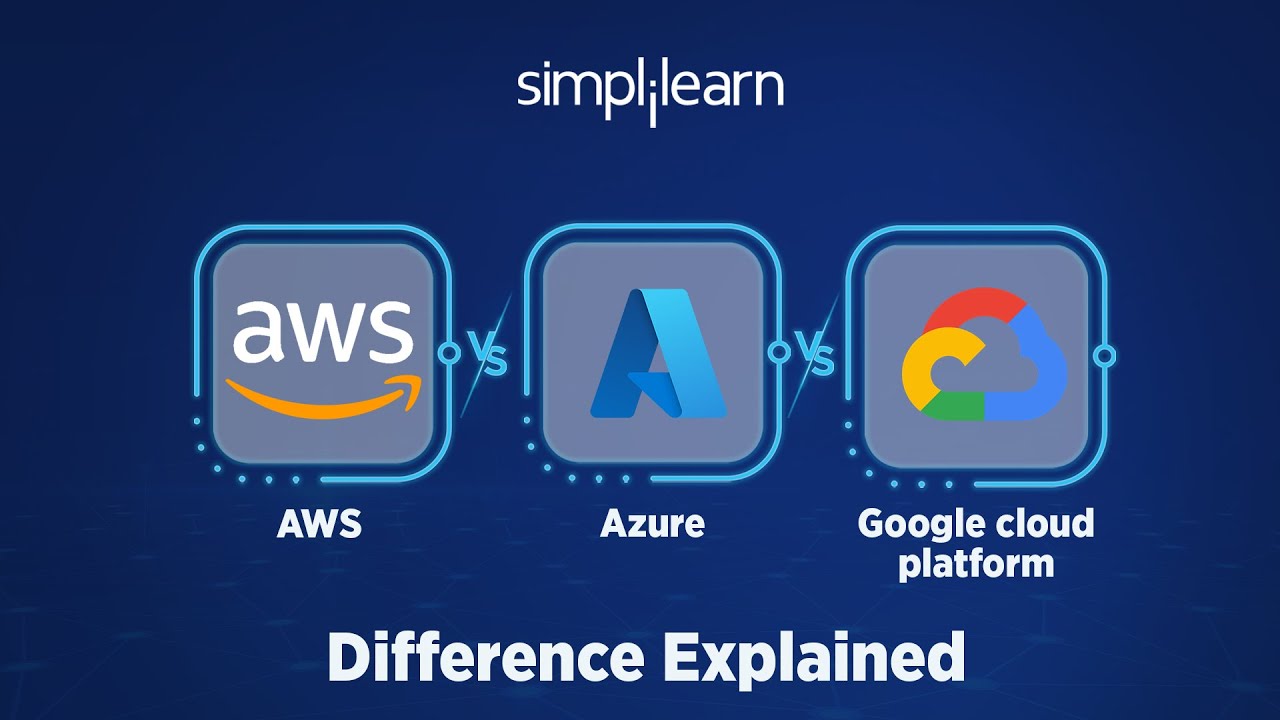Cloud Computing Platforms - Raghu Santanum, CIS 194 Mod4
Summary
TLDRThis video introduces alternative cloud computing platforms to AWS, focusing on Microsoft Azure, Google Cloud, and IBM Cloud. The speaker discusses the similarities and distinctions among these services, emphasizing the importance of understanding foundational concepts for a smoother transition between platforms. They also highlight the evolving nature of the cloud market, including the emergence of intermediaries and specialized services. The video stresses the necessity for businesses to evaluate options carefully, considering factors like cost, flexibility, and strategic integration when choosing cloud services.
Takeaways
- 🌥️ AWS is the largest cloud computing provider, but there are several alternatives worth considering.
- 🔍 Awareness of other cloud platforms like Microsoft Azure, Google Cloud, and IBM Cloud is essential for informed decision-making.
- ⚖️ Just as with personal technology choices (iPhone vs. Android), businesses must weigh the pros and cons of different cloud services.
- 🔄 Transitioning between cloud platforms can involve a learning curve and potential application compatibility issues.
- 📊 Microsoft Azure offers virtual machines, databases (SQL Server, MySQL, PostgreSQL), data warehousing, and machine learning tools.
- ☁️ Google Cloud features compute engines, Bigtable for database management, analytics services, and machine learning capabilities.
- 🛠️ IBM Cloud emphasizes a hybrid architecture, integrating public and private cloud services, alongside robust analytics and computing options.
- 🔗 Intermediaries can provide value-added services, allowing businesses to manage applications without direct engagement with major cloud providers.
- 💡 The cloud landscape is dynamic, with continuous emergence of specialized services from companies like Salesforce and Oracle.
- 🔄 Decision-makers must consider trade-offs in cost, flexibility, and strategy when choosing or migrating between cloud platforms.
Q & A
What are the main cloud computing platforms mentioned in the video?
-The main cloud computing platforms mentioned are Microsoft Azure, Google Cloud, and IBM Cloud.
Why is it important for consumers to be aware of multiple cloud computing options?
-Being aware of multiple options allows consumers to make informed decisions based on their specific needs and preferences, just like choosing between different smartphone operating systems.
What similarities exist between AWS and Microsoft Azure?
-Both AWS and Microsoft Azure offer virtual machines, databases (including SQL Server), data warehousing and analytics services, machine learning capabilities, and developer tools.
How does Google Cloud differentiate itself from AWS and Azure?
-Google Cloud differentiates itself with unique offerings like Bigtable for database management, which is designed to handle vast amounts of data across numerous websites, and its approach to machine learning services.
What is the emphasis of IBM Cloud in terms of cloud architecture?
-IBM Cloud emphasizes a hybrid architecture, allowing integration of personal cloud infrastructure with public cloud services. This approach supports a mix of on-premises and cloud-based solutions.
What role do intermediaries play in cloud computing?
-Intermediaries provide value-added services that simplify application hosting and management for businesses, often utilizing major cloud platforms like AWS, Azure, or IBM in the backend.
What historical examples are provided to illustrate market evolution in technology?
-Examples include Blackberry, once the leading mobile operating system, which has nearly disappeared, and NeXT OS, developed by Steve Jobs but never gained significant traction.
What certification options are available for users interested in cloud computing?
-Users can pursue certification programs for Microsoft Azure and Google Cloud, similar to the AWS Cloud Foundation or Cloud Practitioner certificate.
What should decision-makers consider when choosing a cloud service provider?
-Decision-makers should evaluate trade-offs in cost, flexibility, potential lock-in issues, and the overall strategy for integrating cloud services into their organization.
What benefits do cloud platforms typically offer to new users?
-Most cloud platforms offer a free tier, allowing users to test and experiment with their services before committing to a full migration.
Outlines

Dieser Bereich ist nur für Premium-Benutzer verfügbar. Bitte führen Sie ein Upgrade durch, um auf diesen Abschnitt zuzugreifen.
Upgrade durchführenMindmap

Dieser Bereich ist nur für Premium-Benutzer verfügbar. Bitte führen Sie ein Upgrade durch, um auf diesen Abschnitt zuzugreifen.
Upgrade durchführenKeywords

Dieser Bereich ist nur für Premium-Benutzer verfügbar. Bitte führen Sie ein Upgrade durch, um auf diesen Abschnitt zuzugreifen.
Upgrade durchführenHighlights

Dieser Bereich ist nur für Premium-Benutzer verfügbar. Bitte führen Sie ein Upgrade durch, um auf diesen Abschnitt zuzugreifen.
Upgrade durchführenTranscripts

Dieser Bereich ist nur für Premium-Benutzer verfügbar. Bitte führen Sie ein Upgrade durch, um auf diesen Abschnitt zuzugreifen.
Upgrade durchführenWeitere ähnliche Videos ansehen

Day 1/100 || What is cloud computing ? || 100 Days Cloud Challenge || AWS in hindi||

AWS vs AZURE vs GOOGLE CLOUD | 2023 | How to Choose the right certification?

Cloud Computing In 6 Minutes | What Is Cloud Computing? | Cloud Computing Explained | Simplilearn

¿Que es cloud computing? Curso Cloud

AWS vs Azure vs GCP | Amazon Web Services vs Microsoft Azure vs Google Cloud Platform | Simplilearn

How Cloud Computing Became a Big Tech Battleground | WSJ
5.0 / 5 (0 votes)
